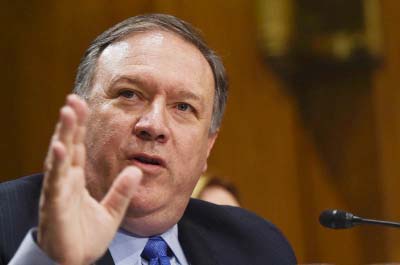
Russia scoffed at a US declaration that said Washington would not accept Moscow’s annexation of Crimea, suggesting the country’s Ukraine policy could change in the future.
“We know the worth of these ‘fateful declarations’,” Russian foreign ministry spokeswoman Maria Zakharova said in a sarcastic comment on Facebook late Wednesday.
She suggested that Washington’s Crimea policy could still change-perhaps even under a new leader in the future.
In the declaration, US Secretary of State Mike Pompeo called on Russia to “end its occupation of Crimea,” and said Moscow had sought to “undermine a bedrock international principle” shared by democratic states, that no country can change the borders of another by force. Ukrainian President Petro Poroshenko hailed Washington’s “historic” statement, calling it a “worthy response” to the Kremlin’s provocations after Donald Trump’s hugely controversial summit with Russian President Vladimir Putin last week.
The US administration stepped up its damage control operation and on Wednesday also delayed a second summit with the Kremlin chief until next year.
There was no immediate Kremlin reaction to the postponement, which was announced just a day after the Kremlin said Putin and Trump had agreed in Helsinki to continue their “useful contacts”. Zakharova derided what she called the inconsistency of Washington’s policies, citing as examples US reversals on the 2015 Iran nuclear deal and the Paris agreement on slowing climate change.
These “were also official US policy not long ago” because Trump’s predecessor Barack Obama “personally decided so”, she said.
“And then Trump came and decided differently,” she said. The US declaration came after the Russia’s ambassador to Washington said Putin had made concrete proposals on resolving the conflict in eastern Ukraine to Trump at the Helsinki summit.
The ambassador, Anatoly Antonov, spoke after a media report said Putin had called for a referendum to be held with the help of the international community in Ukraine’s breakaway regions of Donetsk and Lugansk, which Russia-backed separatists control.
· ‘Learn from Helsinki’ –
Speaking about a possible new summit between the Russian and US leaders, Putin’s top foreign policy aide Yury Ushakov said earlier this week that the Kremlin received several days after the Helsinki meeting a US proposal to organise a new summit in Washington “at the end of the year”.
Dmitri Trenin, director of the Carnegie Moscow Center, said the postponement of a new summit was “the right move”.
“Both sides need to focus on what deliverables can be,” he said on Twitter.
“Most important however is not to let US domestic politics overshadow international diplomacy. Learn from Helsinki!”
After a Western-backed popular uprising in Kiev in 2014 ousted a pro-Kremlin regime, Russia annexed Crimea and moved to support a separatist insurgency in Donetsk and Lugansk.
Moscow made Crimea part of Russia after a hastily conducted referendum whose results were rejected by the international community.
Putin has said the results of the vote would not be revisited.

